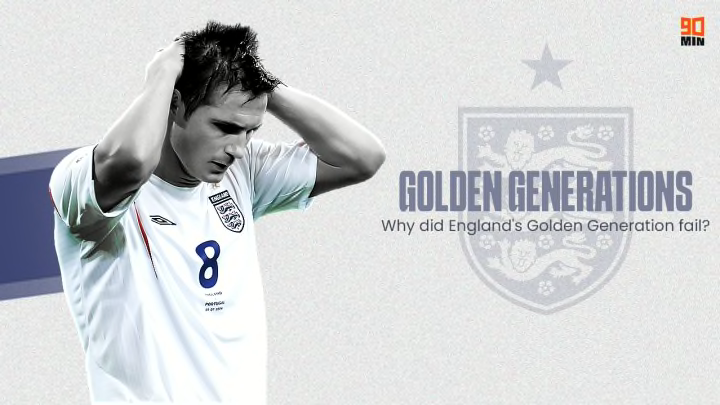Why did England's Golden Generation fail?
- England's crop of internationals during early 2000s hailed as a Golden Generation
- Repeated failures with a star-studded squad sparked eternal debates
- Euro 2008 humiliation brought controversial period to an abrupt end
By Tom Gott

Few countries have been able to enjoy the sort of individual quality boasted by England during the 2000s.
The Three Lions squad was routinely stacked with global superstars but never came remotely close to living up to the expectations placed on them, with a failure to qualify for Euro 2008 bringing the excitement to an abrupt end.
Here's a look back at what went wrong for England's famous Golden Generation.
Club allegiances ruled supreme
While everyone in the England dressing room wanted to steer the Three Lions to victory, most of the big names found it impossible to distance themselves from their club allegiances.
Manchester United players couldn't co-exist with Liverpool stars. Representatives from Chelsea and Arsenal were divided by a grudge so strong that it could not be repaired during short international camps.
Many have spoken openly about this issue, including former United centre-back Rio Ferdinand.
"It killed that England team, that generation," he told The Times.
"One year we would have been fighting Liverpool to win the league, another year it would be Chelsea. So I was never going to walk into the England dressing room and open up to Frank Lampard, Ashley Cole, John Terry or Joe Cole at Chelsea, or Steven Gerrard or Jamie Carragher at Liverpool because of the fear they would take something back to their club and use it against us.
"I didn't realise that what I was doing was hurting England at the time. I was so engrossed, so obsessed with winning with Man Utd - nothing else mattered.''
Egos and frostiness
It has been suggested that England's Golden Generation was perhaps too strong for its own good.
The likes of Terry, Lampard, Ferdinand, Gerrard, David Beckham, Michael Owen, Wayne Rooney - these are all undisputed superstars of the game. Regardless of which club you prefer, there's no denying the individual talent on offer in this squad.
However, that ended up contributing to their downfall. Not only were these players too used to being the focal points of their respective clubs' success, but they ended up becoming so big that no manager had the courage to make the tough call of dropping one or two.
Sven-Goran Eriksson, Steve McClaren and Fabio Capello all took different approaches to managing that overflow of talent. Some cowered in fear of controversy, while others tried to lay down the law and challenge England's stars, but neither approach went down well with a bunch of players who could not put the collective above the individual.
Fatal lack of balance
The issue of egos bled over into England's tactics, where the plan of filling the starting lineup with superstars was simply not suitable for international football.
England famously endured a conundrum of trying to make a Lampard-Gerrard partnership work. On paper, that's an unstoppable duo, but the two attack-minded midfielders often got in each other's way and left huge gaps behind them.
Someone like Owen Hargreaves may have been more beneficial to the team, but he did not have the starpower needed to force his way into a team that was already so scared of dropping a superstar that Paul Scholes was playing as a left-winger. Further down the line, Michael Carrick may have found himself in a similar conundrum.
The priority became fielding the best group of 11 players, rather than the best tactical unit, and many members of this Golden Generation have publicly questioned the tactics in which they found themselves.
"Our biggest issue was being behind other countries tactically," Joe Cole told FourFourTwo. "We had great players but the system wasn't suited to international football, particularly in hot weather. We didn’t keep possession and ran ourselves ragged.
"We had the players to get a goal here and there, but that was often despite our tactics – we relied on somebody popping up with a bit of magic. That’s no way to win a tournament."
Mental weakness
Lampard has admitted the pressure of being described as a 'Golden Generation' ultimately took its toll on the squad, who found it hard to carry their club swagger over to the international scene.
Reflecting on his early days with the England squad, Rooney told the Stick to Football podcast that he could sense "fear" in some of the players, who simply did not feel up for the challenge of competing at the 2006 World Cup, where the Three Lions fell to Portugal in the quarter-finals.
At club level, these were players who knew they were the best around - many of whom had the trophy cabinets to prove it - but the inability to replicate England's heroes from 1966 created a difficult atmosphere that ultimately prevented anybody from showing their best form.
While England were struggling, the likes of France, Brazil, Germany and Spain were regularly putting the pieces together with squads which, to a man, were inferior. Nobody had the answers, and that lack of confidence continuously caught up with them when the pressure was at its highest.
Next. Euro 2024 sweepstake. PLAY: Our Euro 2024 sweepstake (UK only). dark